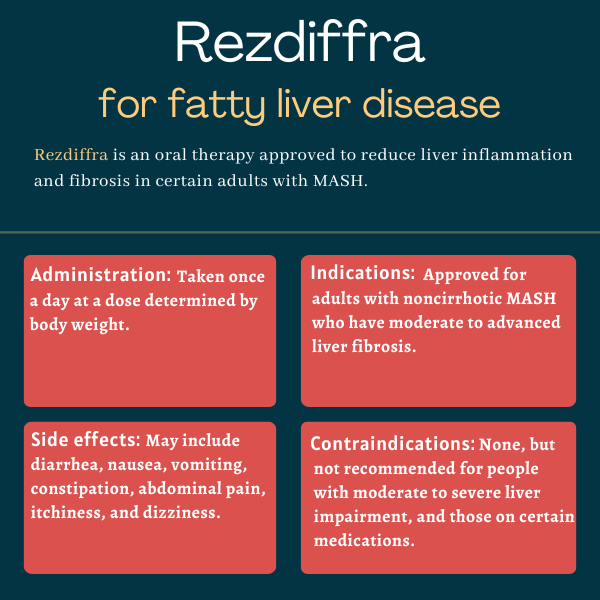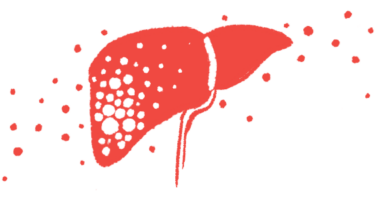
Rezdiffra (resmetiron) for fatty liver disease
Last updated Aug. 28, 2025, by Marisa Wexler, PhD

What is Rezdiffra for fatty liver disease?
Rezdiffra (resmetiron) is an oral therapy conditionally approved in the U.S. for certain adults with metabolic dysfunction-associated steatohepatitis (MASH), a serious form of fatty liver disease.
The therapy can lower liver inflammation and ease liver scarring, or fibrosis, in MASH patients with moderate to advanced liver fibrosis, but no irreversible liver scarring or cirrhosis.
Liver damage in MASH is driven by excess liver fat, which is closely associated with metabolic conditions like obesity, high blood pressure, diabetes, or high levels of fatty molecules in the blood.
The medication works by activating thyroid hormone receptor beta (THR-beta), a receptor protein involved in metabolism regulation and is found primarily in liver cells. People with MASH often have impaired THR-beta activity, which has been linked to impaired fat metabolism and liver fibrosis. By restoring THR-beta function, Rezdiffra should reduce liver fat, slow disease progression, and prevent further scarring.
Rezdiffra, the first therapy to be approved for MASH worldwide, is sold by Madrigal Pharmaceuticals. Conditional, or accelerated, approval means a therapy can be marketed based on preliminary efficacy data, but additional clinical testing is needed to support a full approval.
Therapy snapshot
| Brand name: | Rezdiffra |
| Chemical name: | Resmetiron |
| Usage: | Used to lessen liver inflammation and fibrosis in adults with noncirrhotic MASH and moderate to advanced liver fibrosis |
| Administration: | Oral tablets |
Who can take Rezdiffra?
In the U.S., Rezdiffra is cleared for use in combination with increased physical activity and a reduced-calorie diet to treat adults with MASH who have moderate to advanced liver fibrosis, but no cirrhosis.
It’s also conditionally approved in the European Union for the same indication.
Rezdiffra’s prescribing information does not list any contraindications, but notes the therapy is not recommended for use in people:
- with moderate to severe liver function impairment
- who take medications that act by suppressing certain liver enzymes and molecules involved in Rezdiffra’s transport and breakdown in the liver
How is Rezdiffra administered?
Rezdiffra is taken in the form of oral tablets, once daily, with or without food.
- For people weighing less than 100 kg (about 220 pounds), the recommended dose is 80 mg daily.
- For people weighing 100 kg or more, the recommended dose is 100 mg daily.
The dosage may be reduced in patients taking certain medications that may increase blood levels of the therapy and increase the risk of adverse events.

Rezdiffra in clinical trials
Rezdiffra’s conditional approval in the U.S. was supported by results from an ongoing placebo-controlled Phase 3 clinical trial called MAESTRO-NASH (NCT03900429) that enrolled more than 1,700 adults with MASH and moderate-to-advanced liver fibrosis.
In the study’s first primary analysis, 966 participants received either one of two doses of the therapy (80 and 100 mg) or a placebo for a year. Results showed that Rezdiffra-treated participants were significantly more likely to experience:
- MASH resolution without worsening of liver fibrosis
- a reduction in liver fibrosis without MASH worsening
The MAESTRO-NASH trial is still ongoing to test whether participants given Rezdiffra are less likely than those on a placebo to experience liver-related outcomes, including progression to cirrhosis, undergo liver transplant, or die after about 4.5 years of follow-up.
A separate Phase 3 study called MAESTRO-NASH-OUTCOMES (NCT05500222) is testing Rezdiffra against a placebo in adults with MASH who have well-compensated cirrhosis, meaning the liver is able to function well despite being irreversibly scarred. This study aims to see if the therapy reduces the risk of death or severe liver problems after three years of follow-up. If positive, its findings may be used to help expand Rezdiffra’s label to this subgroup of MASH patients.
Rezdiffra side effects
Mostf side effects observed with Rezdiffra are mild to moderate in severity. The most common ones include:
- nausea
- vomiting
- diarrhea
- constipation
- abdominal pain
- itchiness
- dizziness
Rezdiffra may also cause other safety issues that may require monitoring or treatment adjustments, including:
- liver damage
- problems related to the gallbladder
Liver Disease News is strictly a news and information website about the disease. It does not provide medical advice, diagnosis, or treatment. This content is not intended to be a substitute for professional medical advice, diagnosis, or treatment. Always seek the advice of your physician or other qualified health provider with any questions you may have regarding a medical condition. Never disregard professional medical advice or delay in seeking it because of something you have read on this website.
Recent Posts
- New test detects hepatitis B in 1 hour with a finger prick: Study
- Noninvasive combo tests for liver damage could replace biopsies in PBC
- With Livmarli approval, PFIC patients in Canada have new itch relief option
- Coalition to push for earlier diagnosis of fatty liver disease MASLD
- I’m grateful my son has a care team that truly cares




